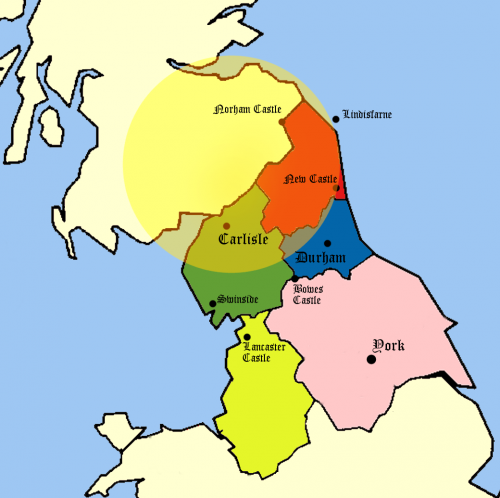Northern England
History
- North Yorkshire plays host to numerous untouched barrows, although many have faded into the land over time. In the Pennines and away from the valleys, it’s not uncommon to find strange stone circles or signs of inhabitation by something long-since forgotten.
- Durham Cathedral houses the relics of Saint Cuthbert, who brought Christianity to England, and the Venerable Bede, scholar and magician.
- In 793 the Vikings sacked the Holy Island of Lindisfarne. From there the Saxon invaders set out to conquer England. Although initially driven back by Queen Anna, they eventually overrun the country and remain the rulers until the Norman Conquest.
- Following the Conquest a great many Saxons retreat back to the northern hills to plan their vengeance; William gets his in first. His campaign of terror 'the Harrying of the North' sees almost all settlements in Yorkshire looted and the inhabitants slaughtered. Villages and towns are razed to the ground and the land salted.
- Scotland invades Cumbria in 1180 and occupies it until Henry II defeats Malcolm at the Battle of Northallerton and drives the Scottish back beyond Carlisle.
Politics
By the middle of the 12th century, the lands of Northern England are firmly under Norman control. However, the region is one of the most fragmented and dispute-ridden of all the areas in the Kingdom.
Northumberland has always suffered from Scottish raiders, but with the nobles gone and the throne empty, the situation is getting progressively worse there. It is predicted that Northumberland will fall to the Scots within a year unless the necessary military force can be raised to protect it. New Castle is holding out as best it can, but the garrison is small and the soldiers are not currently being paid - by anyone official.
The Liberty of Durham: Lands controlled directly by the Bishop of Durham: the Liberty is one of the main sources of revenue for the Catholic Church in England. People of the Liberty remember the Harrying of the North, and are distrustful of the monarchy and the barons. There is general goodwill towards the Church, as the current Bishop of Durham is considerate towards the poor. Durham Cathedral contains the relics of Saint Cuthbert, who brought Christianity to England. It is said that the weight of gold and jewels on his tomb is worth a King's ransom.
Cumbria: Most Cumbrians grew up when the lands were under Scottish control. They dislike the Scottish raiders, but distrust the new English lords, seeing them as upstart nobodies. The Lake District is frequently plagued by Fae creatures - the infamous Lady of the Lake was drowned in Windermere by the Knights of St George - and many Cumbrians make a prosperous living opening taverns and hostelries and selling coffins for travelling adventurers.
Cheshire and Lancashire: Up until recently, the entirety of Lancashire and Cheshire – prosperous but relatively uneventful breadbaskets – were controlled by the Earl of Cheshire; Ranulph de Blondeville. With Cheshire’s great economic might, Blondeville was for a time one of the richest men in the Kingdom. However, although Blondeville has never taken up arms against the royal family, his constant bickering with them and attempts to extort more and more riches and honours around the country lead the late King to employ punitive measures against him; the lands of Lancashire have been stripped from the honour of Cheshire, and made into their own county which is held by the crown. With both the royal family and the Earl away at war, there is a curious power vacuum. It has been rumoured that many members of the Earl’s court have been openly plotting against the administrators of Lancashire and within their own ranks to grow their power.
Yorkshire: destroyed almost completely by the Harrying, the growth of the wool trade between Flanders and Hull has seen some economic growth return to the area. The people of Yorkshire are largely descended from those who fled the Harrying. Most openly worship the Old Gods and many follow the Daughter of Carnage. Many have sworn oaths never to rest until every last Norman is driven from England into the North Sea.
Society
Commerce
The North had mines prior to the Harrying. The miners were killed and the pits filled in. If they could be re-opened, the North could become rich, for there were substantial deposits of lead, coal and iron.
The terrain of the North is much hillier than that of Southern England and is principally used for sheep farming and banditry.
Holy Sites
Lindisfarne: Home of the primary monastery of Saint Edith, which has been looted so many times not a trace of the treasure is left. Lindisfarne is also associated with Saint Cuthbert,
Swinside: A complete stone circle, almost certainly a relic of Saxon worship.
Durham Cathedral: A new cathedral built by William Rufus as a fitting resting place for Saint Cuthbert, it was built on the site of the old wooden cathedral, which was torn down. It contains the relics of Saint Cuthbert and Saint Bede.
Fountains Abbey: Now another shrine of Saint Edith, despite having once been consecrated to The Lady of the Shadows.
Tales of Folk and Fey
Aedroth
They change their form each time they are seen, but always identify themselves with one name - Aedroth. Nobody's sure if they're one Fae with many forms, or many Fae all with one name. Either way, they're creepy.
Fair Janet and Tam Linn
There is absolutely no evidence that Janet Percy's husband is a faerie and Janet will pay a large sum to anyone who can stop these scurrilous rumours. He's just a bit different, and a really good harp player. He needs support and understanding. Stop asking him to perform magic at parties. It makes him nervous.
The Wild Hunt
RUN

